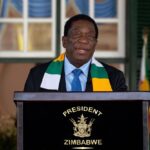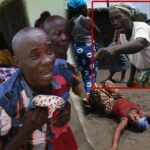Harare – President Emmerson Mnangagwa is facing mounting pressure over the planned protests slated for 31 March, amidst growing challenges to his rule, which has been plagued by accusations of corruption and cronyism. The President’s grip on power is being tested from within his own party, with disgruntled war veterans leading the charge in calls for his resignation.
Adding to the intrigue, axed Zanu-PF Central Committee member Blessed Geza, reportedly spearheading a campaign for Mnangagwa’s deputy, Constantino Chiwenga, to take over the country’s leadership, has publicly called for nationwide protests on 31 March.
Addressing the Politburo on Wednesday, Mnangagwa pleaded with Zimbabweans not to heed the calls for protests.
“I applaud all my fellow citizens from across the country, for their clarity, national consciousness and patriotism that continue to squash efforts by malcontents and rogue delusional elements bent on disturbing our peace, unity and harmony,” Mnangagwa stated.
He further asserted that Zanu-PF remains strong, urging the party’s leadership to remain vigilant. “Our Party Constitution is sacred, it is like roots and the trunk of a tree, and we, the members, are its branches. As with any other revolution, those who do not toe the correct line of the revolution must fall by the wayside.”
Despite the internal turmoil, Mnangagwa remained defiant, stating that his detractors can “continue barking,” but nothing will stop him, Zanu-PF, and the country from moving forward.
“Zimbabwe will forever be a constitutional democracy and sovereign nation. With all of us living in peace and harmony. Let those barking continue barking while I am moving the country forward,” he declared to ululations from his close allies, while a visibly tense Chiwenga watched on.
Mnangagwa added: “People who disturb our peace as Zimbabweans, down with them, we will remain sovereign and in peace. Zanu-PF is an unstoppable train. In Zanu-PF, we follow the party constitution; those who do not follow shall fall [by the wayside].”
The President’s remarks come as tensions within Zanu-PF continue to escalate, with the party reportedly divided between a faction supporting Mnangagwa’s bid to retain power beyond the constitutionally stipulated two terms and another faction backing Chiwenga.
A Zanu-PF insider aligned to Chiwenga echoed Geza’s sentiments, stating: “Geza is correct, and Mnangagwa should fulfil the agreement that he had with the general (Chiwenga) that he was supposed to rule for two terms and hand over the baton to him, but now he is refusing and wants to extend his rule.”
While Mnangagwa has previously stated his commitment to upholding the constitution and stepping down in 2028 after his two terms, his close allies within the party are reportedly campaigning for him to extend his rule to 2030. Analysts also believe that behind the scenes, Mnangagwa is working to extend his rule.
News24 reported on Wednesday that armed police with water cannons have been patrolling the streets of the capital city, Harare, since Monday ahead of the 31 March protest, a move viewed by citizens as an intimidation tactic to discourage participation.
However, an insider within Zanu-PF who is aligned to Chiwenga described the removal of Sanyatwe as “a Sarajevo moment which might trigger uprising, instability protests and removal of Mnangagwa.”
The insider added: “If they make the mistake of also expelling Chiwenga from the Zanu-PF, things will worsen in this country.”
Political analyst Rashweat Mukundu said Sanyatwe’s firing and reassigning were evidence of instability within Zanu-PF and the government.
“There is nothing ordinary about firing Zimbabwe National Army commander Sanyatwe; in fact, there is everything suspicious and political about this move because he becomes the first Zimbabwe National Army commander to be fired after just two or so years of leading the army,” Mukundu stated.
Adding another layer of complexity to the situation, legal experts have questioned the constitutionality of Sanyatwe’s removal. According to a senior researcher at the Institute for Security Studies, Dr Edknowledge Mandikwaza, the move may be in violation of the law.
“Legally, an office warder with his stature cannot be simply transferred without the notification of retirement going through Parliament, which has not happened at the moment. So what it means is, technically, he remains the boss,” Mandikwaza explained.
Dr Mandikwaza further elaborated on the broader political and leadership crisis in Zimbabwe, tracing its roots back to the military coup in 2017. He pointed to rising poverty, poor economic performance, a bad human rights record, and declining social service delivery as key challenges facing the country.
In addition, Zimbabwe has always had dissenting voices due to questionable electoral outcomes since the political transition from Mugabe to Mnangagwa.
“After the 2023 elections, the government went into overdrive in its efforts to destroy the opposition, ending the era of accountability in Parliament and public institutions and making the country a one-party state,” Dr Mandikwaza stated.
He also highlighted the issue of political factionalism within the ruling party, which has been playing out in government.
“[It] erupted within the ruling party, beginning with the current sitting president indicating indirectly through party members and supporters that there might be a need for him to extend his term of office beyond 2028 when he is officially supposed to step down because he would have served two terms,” Dr Mandikwaza explained. “This created a lot of conflict and internal strife. We then returned to the 2017 situation where the war veterans raised a point of order against the sitting president.”
Dr Mandikwaza drew parallels between the current situation and the events leading up to the 2017 coup, noting the similarities in the way war veterans are voicing their discontent with the sitting president.
Weighing in on Mnangagwa expelling Sanyatwe on Tuesday night, Mandikwaza said the perception was that he was closer to the vice-president who, within the political structure, would be Mnangagwa’s successor.
“His removal could signal that the infighting has reached a political crescendo where it can no longer be kept within the [leadership],” Dr Mandikwaza stated.
He also suggested that if a coup were to occur, it would likely involve mobilising citizens to take to the streets to legitimise any political changes.
Turning to the regional implications of the crisis in Zimbabwe, Dr Mandikwaza emphasised the need for SADC leaders to engage constructively with Mnangagwa to ensure that the situation does not escalate into a coup and bloodshed.
“It’s important for SADC leaders to engage constructively with their peer in Zimbabwe to ensure that there is mutual engagement and dialogue to ensure that the situation does not ultimately result in a coup and bloodshed,” he stated.















